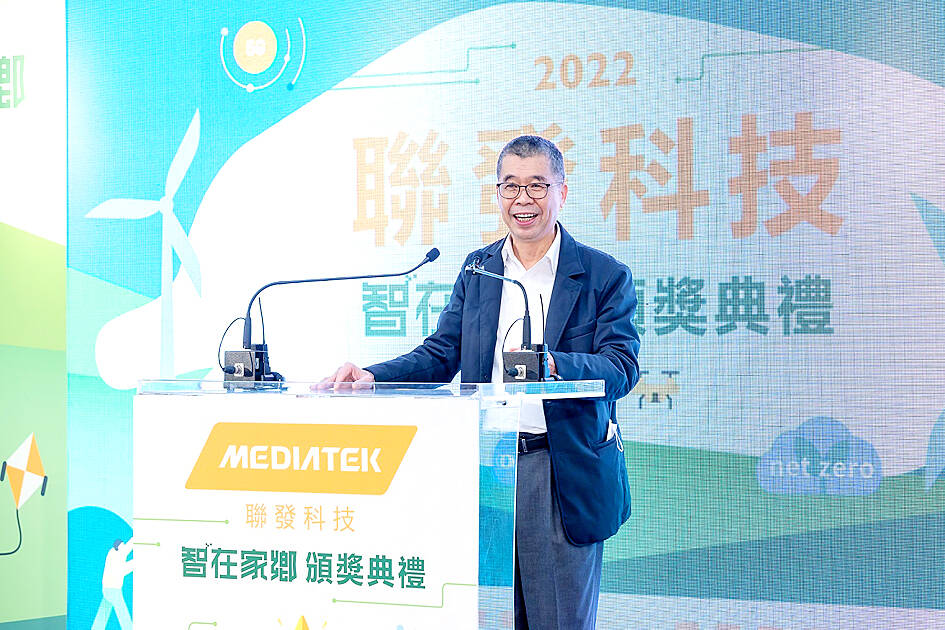MediaTek Inc (聯發科) yesterday said it expects non-mobile phone chips, such as automotive chips, to drive its growth beyond 2025, as it pursues diversification to create a more balanced portfolio.
The Hsinchu-based chip designer said it has counted on smartphone chips, power management chips and chips for other applications to fuel its growth in the past few years, but it is developing new products to continue growing.
“Our future growth drivers, of course, will be outside of smartphones,” MediaTek chairman Rick Tsai (蔡明介) told shareholders at the company’s annual general meeting in Hsinchu City.

Photo courtesy of MediaTek Inc
“As new products would be available next year at the earliest, or in 2025, they would produce results after 2025. Non-smartphone [chip] products will be very important to drive future growth,” he said.
MediaTek, the world’s biggest supplier of smartphone chips, on Monday said that it was teaming up with Nvidia Corp to deliver in-vehicle cabin solutions for next-generation vehicles as early as 2026.
Smartphone chips accounted for 46 percent of MediaTek’s total revenue in the first quarter, down from 52 percent in the previous quarter, as macroeconomic uncertainty continued to take a toll on consumer demand for electronics.
Customers also held back on giving new orders due to high inventory levels in the supply chain, the company said.
The global smartphone industry would continue to face headwinds this year, but the momentum would gradually pick up next year and in 2025 as the global economy improves, Tsai said.
MediaTek shareholders yesterday approved a proposal to distribute a cash dividend of NT$76 per share, including NT$14 from its capital surplus. Last year, the company posted record-high earnings per share of NT$74.59.
UMC
Separately, United Microelectronics Corp (UMC, 聯電) yesterday said it has not seen signs of a solid pickup in the second half of this year as inventory correction in the chip industry has progressed at a slower-than-expected pace.
“Order visibility is short at about three months. Demand for PCs and smartphones remains sluggish,” UMC chief financial officer Liu Chi-tung (劉啟東) told reporters on the sidelines of the chipmaker’s annual shareholders’ meeting in Hsinchu.
Replenishing demand for automotive chips and chips used in industrial devices peaked last quarter, meaning demand for those two segments would stagnate, Liu said.
Automotive chips made up about 17 percent of the company’s overall revenue last quarter.
Capacity utilization of its 12-inch fabs reached 90 percent this quarter, but was lower than average for its for less advanced 8-inch fabs, he said.
UMC last month said average utilization would reach about 72 to 73 percent this quarter.
Asked about reports that UMC was considering building a 12-inch fab in Japan to produce auto chips, Liu said the company would not rule it out if demand is strong in Japan.
Japan and Singapore, where UMC has fabs, top its list if it were to expand abroad, Liu said.
UMC shareholders yesterday approved a proposal to distribute a cash dividend of NT$3.6 per share.
That represented a payout ratio of 50.78 percent — the highest in the company’s history — based on its earnings per share of NT$7.09 last year. The company posted a record net profit of NT$87.2 billion (US$2.83 billion) last year.

The New Taiwan dollar is on the verge of overtaking the yuan as Asia’s best carry-trade target given its lower risk of interest-rate and currency volatility. A strategy of borrowing the New Taiwan dollar to invest in higher-yielding alternatives has generated the second-highest return over the past month among Asian currencies behind the yuan, based on the Sharpe ratio that measures risk-adjusted relative returns. The New Taiwan dollar may soon replace its Chinese peer as the region’s favored carry trade tool, analysts say, citing Beijing’s efforts to support the yuan that can create wild swings in borrowing costs. In contrast,

Nvidia Corp’s demand for advanced packaging from Taiwan Semiconductor Manufacturing Co (TSMC, 台積電) remains strong though the kind of technology it needs is changing, Nvidia CEO Jensen Huang (黃仁勳) said yesterday, after he was asked whether the company was cutting orders. Nvidia’s most advanced artificial intelligence (AI) chip, Blackwell, consists of multiple chips glued together using a complex chip-on-wafer-on-substrate (CoWoS) advanced packaging technology offered by TSMC, Nvidia’s main contract chipmaker. “As we move into Blackwell, we will use largely CoWoS-L. Of course, we’re still manufacturing Hopper, and Hopper will use CowoS-S. We will also transition the CoWoS-S capacity to CoWos-L,” Huang said

Nvidia Corp CEO Jensen Huang (黃仁勳) is expected to miss the inauguration of US president-elect Donald Trump on Monday, bucking a trend among high-profile US technology leaders. Huang is visiting East Asia this week, as he typically does around the time of the Lunar New Year, a person familiar with the situation said. He has never previously attended a US presidential inauguration, said the person, who asked not to be identified, because the plans have not been announced. That makes Nvidia an exception among the most valuable technology companies, most of which are sending cofounders or CEOs to the event. That includes

INDUSTRY LEADER: TSMC aims to continue outperforming the industry’s growth and makes 2025 another strong growth year, chairman and CEO C.C. Wei says Taiwan Semiconductor Manufacturing Co (TSMC, 台積電), a major chip supplier to Nvidia Corp and Apple Inc, yesterday said it aims to grow revenue by about 25 percent this year, driven by robust demand for artificial intelligence (AI) chips. That means TSMC would continue to outpace the foundry industry’s 10 percent annual growth this year based on the chipmaker’s estimate. The chipmaker expects revenue from AI-related chips to double this year, extending a three-fold increase last year. The growth would quicken over the next five years at a compound annual growth rate of 45 percent, fueled by strong demand for the high-performance computing